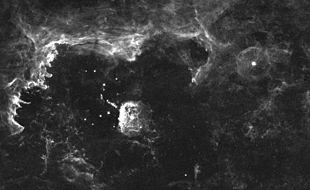| Emission nebula | |
|---|---|
| H II region | |
 False-color image of the Pistol Star and Pistol Nebula, taken by
NICMOS | |
| Observation data: epoch | |
| Right ascension | 17h 46m 15.3s |
| Declination | −28° 50′ 04″ |
| Distance | 25,000 ly |
| Constellation | Sagittarius |

The Pistol Nebula [1] is located in the constellation Sagittarius. It surrounds one of the most luminous stars known, the Pistol Star. [2] Both are located 25,000 light years away from Earth in the Quintuplet cluster, near the center of the Milky Way galaxy. The nebula contains approximately 9.3 solar masses worth of ionized gas that was ejected by the star several thousand years ago.
The nebula was first observed in radio light by the Very Large Array in the early 1980s. [3] [4] It was named for its shape as seen in low resolution images that were available at the time. [5]
The Pistol Star, a luminous blue variable is 1.6 million times brighter than the Sun making it one of the most luminous stars in the Milky Way.
- ^ Figer, Donald F.; Morris, Mark; Geballe, T. R.; Rich, R. Michael; Serabyn, Eugene; McLean, Ian S.; Puetter, R. C.; Yahil, Amos (1999). "High-Resolution Infrared Imaging and Spectroscopy of the Pistol Nebula: Evidence for Ejection". The Astrophysical Journal. 525 (2): 759. arXiv: astro-ph/9906479. Bibcode: 1999ApJ...525..759F. doi: 10.1086/307927. S2CID 19404691.
- ^ Figer, Donald F.; Najarro, Francisco; Morris, Mark; McLean, Ian S.; Geballe, Thomas R.; Ghez, Andrea M.; Langer, Norbert (1998). "The Pistol Star". The Astrophysical Journal. 506 (1): 384–404. Bibcode: 1998ApJ...506..384F. doi: 10.1086/306237.
- ^ Lang, Cornelia C.; Goss, W. M.; Wood, O. S. (1997-01-01). "VLA H92α and H115β Recombination Line Observations of the Galactic Center H II Regions: The Sickle (G0.18-0.04) and the Pistol (G0.15-0.05)". The Astrophysical Journal. 474: 275–291. Bibcode: 1997ApJ...474..275L. doi: 10.1086/303452. ISSN 0004-637X.
- ^ Yusef-Zadeh, F.; Morris, M.; Chance, D. (1984-08-01). "Large, highly organized radio structures near the galactic centre". Nature. 310: 557–561. Bibcode: 1984Natur.310..557Y. doi: 10.1038/310557a0. ISSN 0028-0836.
- ^ Yusef-Zadeh, Farhad; Morris, Mark (1987-11-01). "G0.18-0.04: Interaction of Thermal and Nonthermal Radio Structures in the Arc Near the Galactic Center". The Astronomical Journal. 94: 1178. Bibcode: 1987AJ.....94.1178Y. doi: 10.1086/114555. ISSN 0004-6256.
| Emission nebula | |
|---|---|
| H II region | |
 False-color image of the Pistol Star and Pistol Nebula, taken by
NICMOS | |
| Observation data: epoch | |
| Right ascension | 17h 46m 15.3s |
| Declination | −28° 50′ 04″ |
| Distance | 25,000 ly |
| Constellation | Sagittarius |

The Pistol Nebula [1] is located in the constellation Sagittarius. It surrounds one of the most luminous stars known, the Pistol Star. [2] Both are located 25,000 light years away from Earth in the Quintuplet cluster, near the center of the Milky Way galaxy. The nebula contains approximately 9.3 solar masses worth of ionized gas that was ejected by the star several thousand years ago.
The nebula was first observed in radio light by the Very Large Array in the early 1980s. [3] [4] It was named for its shape as seen in low resolution images that were available at the time. [5]
The Pistol Star, a luminous blue variable is 1.6 million times brighter than the Sun making it one of the most luminous stars in the Milky Way.
- ^ Figer, Donald F.; Morris, Mark; Geballe, T. R.; Rich, R. Michael; Serabyn, Eugene; McLean, Ian S.; Puetter, R. C.; Yahil, Amos (1999). "High-Resolution Infrared Imaging and Spectroscopy of the Pistol Nebula: Evidence for Ejection". The Astrophysical Journal. 525 (2): 759. arXiv: astro-ph/9906479. Bibcode: 1999ApJ...525..759F. doi: 10.1086/307927. S2CID 19404691.
- ^ Figer, Donald F.; Najarro, Francisco; Morris, Mark; McLean, Ian S.; Geballe, Thomas R.; Ghez, Andrea M.; Langer, Norbert (1998). "The Pistol Star". The Astrophysical Journal. 506 (1): 384–404. Bibcode: 1998ApJ...506..384F. doi: 10.1086/306237.
- ^ Lang, Cornelia C.; Goss, W. M.; Wood, O. S. (1997-01-01). "VLA H92α and H115β Recombination Line Observations of the Galactic Center H II Regions: The Sickle (G0.18-0.04) and the Pistol (G0.15-0.05)". The Astrophysical Journal. 474: 275–291. Bibcode: 1997ApJ...474..275L. doi: 10.1086/303452. ISSN 0004-637X.
- ^ Yusef-Zadeh, F.; Morris, M.; Chance, D. (1984-08-01). "Large, highly organized radio structures near the galactic centre". Nature. 310: 557–561. Bibcode: 1984Natur.310..557Y. doi: 10.1038/310557a0. ISSN 0028-0836.
- ^ Yusef-Zadeh, Farhad; Morris, Mark (1987-11-01). "G0.18-0.04: Interaction of Thermal and Nonthermal Radio Structures in the Arc Near the Galactic Center". The Astronomical Journal. 94: 1178. Bibcode: 1987AJ.....94.1178Y. doi: 10.1086/114555. ISSN 0004-6256.